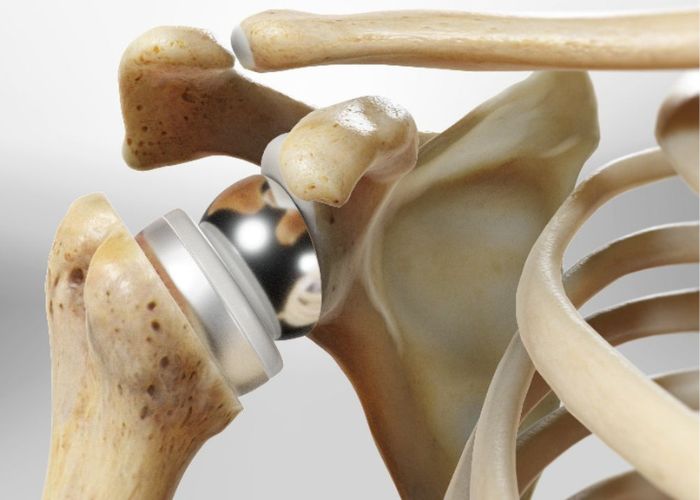
Book An Appointment
Shoulder replacement
The shoulder is one of the most flexible and important joints in the body, enabling a wide range of movements like lifting, rotating, and reaching. However, conditions such as severe arthritis, rotator cuff injuries, fractures, or chronic joint degeneration can cause debilitating pain and limit mobility. When other treatments like medication, physical therapy, or injections fail to provide relief, shoulder replacement surgery becomes a viable solution.
Shoulder replacement is a surgical procedure that involves replacing the damaged parts of the shoulder joint with artificial components, called prostheses. These components may include a metal ball and a plastic socket or other designs depending on the type of surgery. The goal of this procedure is to relieve pain, restore movement, and improve overall quality of life. There are three main types of shoulder replacement surgeries:
Total Shoulder Replacement
Both the ball (humeral head) and socket (glenoid) are replaced.
Partial Shoulder Replacement
Only the damaged ball is replaced with a prosthetic component.
Reverse Shoulder Replacement
Used when the rotator cuff is severely damaged, the positions of the ball and socket are reversed to stabilize the joint.
This life-changing procedure allows individuals to return to their daily activities without the limitations caused by chronic pain or reduced mobility.
How Dr. Nitish Kapil Helps with Shoulder Replacement
Dr. Nitish Kapil is a trusted Orthopaedic surgeon with extensive expertise in shoulder replacement surgeries. His patient-centric approach and advanced surgical techniques ensure optimal outcomes for individuals needing this procedure. Here’s how Dr. Nitish Kapil addresses shoulder replacement:
Comprehensive Evaluation
Dr. Nitish Kapil performs a detailed assessment, including physical examinations, imaging tests (X-rays or CT scans), and medical history reviews, to determine the extent of joint damage and the best type of replacement surgery.
Personalized Treatment Plan
Every individual is unique, and Dr. Nitish Kapil tailors treatment plans to suit the specific needs, lifestyle, and goals of those he treats.
Minimally Invasive Techniques
Dr. Nitish Kapil employs advanced surgical methods to minimize tissue damage, reduce recovery time, and enhance surgical outcomes.
Rehabilitation Support
Post-surgery, Dr. Nitish Kapil collaborates with physiotherapists to design a rehabilitation program focused on restoring strength, mobility, and function in the shoulder.
Ongoing Care
Dr. Nitish Kapil ensures continued support throughout the recovery process, monitoring progress and addressing any concerns to promote a smooth healing journey.
With his expertise, Dr. Nitish Kapil helps individuals regain pain-free movement and return to their daily activities with improved shoulder function.
Symptoms That May Require Shoulder Replacement
- 1. Persistent pain in the shoulder, even at rest or during sleep
- 2. Difficulty performing everyday tasks, such as lifting objects or reaching overhead
- 3. Loss of motion or stiffness in the shoulder joint
- 4. Weakness in the shoulder muscles
- 5. Grinding, clicking, or popping sounds during shoulder movement
Solutions for Shoulder Conditions Requiring Replacement
Non-Surgical Approaches
Initially, treatments like physical therapy, anti-inflammatory medications, and cortisone injections may be attempted to alleviate symptoms.
Shoulder Replacement Surgery
For severe joint damage, replacing the damaged parts of the shoulder with artificial components is the most effective solution.
Rehabilitation Program
A structured rehabilitation plan is essential post-surgery to restore mobility, build strength, and ensure the longevity of the replacement.
Lifestyle Adjustments
Incorporating exercises to maintain joint flexibility and avoiding heavy lifting can help maintain shoulder health after surgery.
Dr. Nitish Kapil’s expertise in shoulder replacement ensures a seamless journey from diagnosis to recovery. His dedication to precision and care helps individuals reclaim their mobility and live a life free of shoulder pain.




